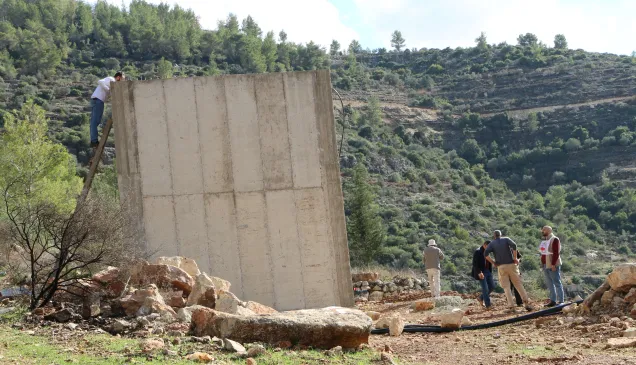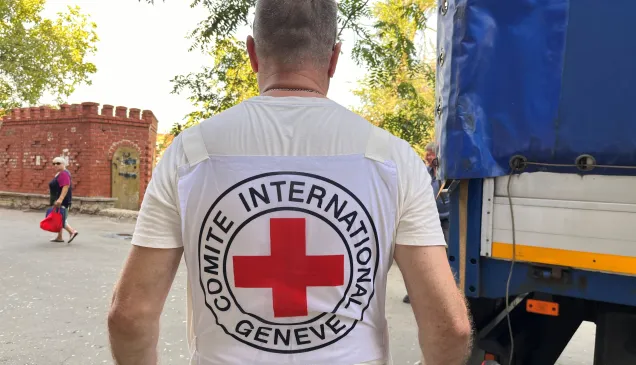Confidentiality Q&A
In a social media age when each of us can denounce violations, ICRC's confidential approach saves lives.
The ICRC works on the ground in conflict zones. We provide people caught up in the fighting with food or medical treatment and help rebuild shattered infrastructure. We also work to promote respect for international humanitarian law.
To gain access to affected communities, we build trust by holding confidential dialogues with all the parties to an armed conflict or those involved in other situations of violence. Our emphasis on confidentiality is sometimes criticized, but it is critical if we are to do our job for people caught up in the fight. The ICRC's Director of Operations, Dominik Stillhart explains.
We live in a world where people have immediate access to facts, images, and stories and where they see evidence of abuse in real time. In a world of social media, is confidentiality even relevant today?
Social media and mobile technology have definitely changed a lot about the way people see the world, the way people work, and the way they understand events around them. And it has changed us too - at the ICRC, we use social media every day to tell the stories of the people we help, to explain our work, and to talk about the issues that are important to us.
But when it comes to our operations on the ground, confidentiality remains absolutely critical. It is the key that opens doors for us that would otherwise remain shut. Without confidentiality, we risk not being able to access people in need and reach places where we need to work. Confidentiality means that we can talk candidly with the people, groups, and parties to an armed conflict or those involved in other situations of violence who otherwise might not be prepared to talk to the ICRC. It means that we can build relationships that are essential to finding solutions and to us being able to do our work. By adopting a confidential approach, we also avoid the risk of politicizing issues through public debate and protect the security of our staff in the field and of the communities we assist. So, in this sense, confidentiality is absolutely relevant today.
I should add that our practice and policy of confidentiality has very deep roots and is directly derived from the principles of neutrality and independence.
Isn't it better to publicize allegations of specific violations? Why is the ICRC so cautious about making public denunciations?
Our focus is always on helping victims of armed conflict and other situations of violence on the ground and we know from experience that confidential dialogue is vital to this. Confidentiality means that we can keep a dialogue going with all sides to a fight and in doing so, we can better help address violations or abuses as they are happening, rather than after the fact.
However, confidentiality does not equal complacency and it isn't unconditional. On some issues we do speak out and may issue denunciations against a particular party. But we only denounce when we have exhausted every other reasonable means of influencing that party, and when these means have not produced the desired result.
For us, this decision is never taken lightly because of the chance that it might undermine the protection and assistance we can provide. Remember, that we work in a lot of places where outside scrutiny – let alone public criticism – is extremely unwelcome. Any decision to talk about allegations or publicly denounce parties has to consider the risk that it might pose to the people we are trying to help by meaning that we aren't able to provide the protection and assistance that is our core purpose. So, for us, confidentiality doesn't mean we are silent. Instead, it means that we are constantly talking to all parties, trying to resolves issues then and there.
Are there any instances when the ICRC would speak out?
Discretion clearly has its limits, and we reserve the right to speak out, publish our findings or stop our work in exceptional cases. If our bilateral confidential dialogue is unsuccessful, we might share our concerns with selected third parties with the view of influencing the behaviour of parties to an armed conflict or those involved in other situations of violence, or even make public denunciations.
But, as I have said, this approach carries real risks for the people we are trying to help and those people are our top priority. So in order to speak out, several specific conditions would have to be met: the violations must be major and repeated or likely to be repeated; our staff must have witnessed the violations with their own eyes, or at least have the information from reliable and verifiable sources; bilateral confidential representations must have failed to stop the violations; and such publicity must be in the interest of those who are affected or threatened.
I think it is also worth remembering that we often offer assessments of the humanitarian situation in conflict-affected countries around the world and we frequently call attention to humanitarian issues. For example, we might issue a news release about the vital need to protect medical facilities and health-care personnel during armed conflict and other situations of violence, or we might work with journalists or photographers to highlight a particularly dire humanitarian situation. We also use our social media channels to get this information out every day.
Do you think that this approach to confidentiality is under pressure?
There is pressure and I think that relates to the changing way people expect to get information and news today. People today want to get their hands on information about atrocities which are being committed in armed conflicts and other situations of violence as soon as they hear of them. Of course, interest and outrage at abuses or violations is not new, but there are a greater number of information sources today.
As I said earlier, we see confidentiality as essential in addressing possible violations of law and as being in the best interest of victims of armed conflicts and other situations of violence. Confidentiality allows us to build trust, gain access and ensure the security both of our staff and the people we are trying to help. Of course, we know that our approach is not the only method of tackling abuses of international humanitarian law. But we see other more public methods as complimentary to our focus on confidentiality, which is a tried and tested approach that enables us to help those affected, as they happen, rather than later on.
What is the connection between the confidential approach and the prosecution of international crimes?
The prosecution of international crimes is essential. As the guardian of international humanitarian law, the ICRC supports processes aimed at prosecuting such crimes within national legislation, as well as setting up international criminal tribunals. When the ICRC communicates with parties to an armed conflict confidentially, we urge them to prevent or put a stop to actual or potential violations, to prevent such violations from recurring, and punish those responsible for them.
However, these real-time confidential interventions are not meant to be used in legal proceedings. Instead, they are supposed to help us focus the attention of people or groups or parties involved in an armed conflict on our concerns and to address them through their own investigation or other measures so that they change their behavior and respect IHL. What we say to these parties or any document that is produced is not meant to be used in legal proceedings. If it was, it would place at risk the confidential dialogue that is crucial for our ability to operate and to provide assistance and protection work on the ground. This is why, even though we support initiatives aimed at prosecuting and punishing those responsible for serious violations of international humanitarian law, we don't participate in legal proceedings or talk publicly about specific cases.
Does the ICRC's confidential approach enjoy any legal protection?
It is really important that our approach to confidentiality is understood and respected. Fortunately, this importance has been widely recognised both internationally and domestically.
Internationally, the International Criminal Court, the UN Mechanism for International Criminal Tribunals, the International Criminal Tribunal for the former Yugoslavia, the International Criminal Tribunal for Rwanda, the Special Tribunal for Lebanon, the Kosovo Specialist Chambers, and the Special Court for Sierra Leone have acknowledged, either through case law or rules of procedure and evidence, that the ICRC has the right to decline to provide confidential information. No other organization has been granted this right. This recognizes the importance of confidentiality as the cornerstone of our work. At the domestic level, close to 100 countries have specifically provided legal safeguards for the ICRC's confidentiality, either by adopting legislation or through a bilateral agreement. These usually stipulate that the ICRC and its staff cannot be asked to give evidence.
Moreover, because the ICRC hands over its reports to parties on a confidential basis, it has the right to insist on non-disclosure of this information by the recipients.



